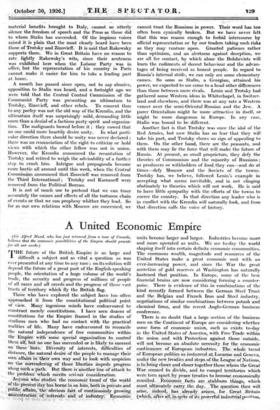Russia
TunwholesOMe excitements that emanate from Moscow are just now matched by sensation at their source. The deVotee.s'of destruction haire found a fruitful field after their own hearts in credulous, distracted -China 'where Bolshevists are fighting for their cause at the cost of other people's blood in Great Britain thiy have continued their political propaganda in we know not what unseen Ways besides the open contribution, labelled fraternal charity, of money wrung from their ill-paid workers to augment the paymenta of the Poor. Law :Guardian's' that keep. our miners, not in comfort, bUt In security against their own or their fannilies' starvation 'while our national Wealth diminishes. The_simple citizen of the United Stites almost albne remain.' s .untroub All Museo.Nry yearns for his loans or credits, bUt is met a bland, unseeing face- in which there is no recogni either personal or official. . . Since the hinds of Stalin grasped the central po the 'discontented grumbles of an Opposition have gro louder ; according to reports that have reached us t have been positively shrill at times. Knowing Opposition and reasonable argument are what no Ja or other fanatic or tyrant can endure, we have wonde at this new ,sign. At the height of Lenin's power daring scarcely survived a moment. — Even Si Mussolini, successful as he is and able to point to material benefits brought to Italy, cannot so utterly silence the freedom of speech and the Press as those did to whom Stalin has succeeded. Of the impious voices raised it is plain that the most clearly heard have been those of Trotsky and Zinovieff. It is said that Rakowsky supports them. We in Great Britain have no reason to rate lightly Rakowsky's wits, since their acuteness was exhibited here when the Labour Party was in office, but the • representation of his country in Paris cannot . make it easier for him to take a leading part at .home. .
A month has passed since open, not to say abusive, opposition to Stalin was heard, and a fortnight ago we were told that the Central Control Commission of the Communist Party was presenting an ultimatum to Trotsky, Zinovieff, and other rebels. To consent thus to any parley was not the old way of the Kremlin, and the ultimatum itself was surprisingly mild, demanding little more than a denial of a factious party spirit and organiza- tion. The malignants bowed before it ; they vowed that no one could more heartily desire unity. - In what parti- cular direction there should be unity was never declared ; there was no renunciation of the right to criticize or hold views with which the other fellow was not in union. However, the Kremlin announced. the recantation of Trotsky and retired to weigh the advisability of a further step . to crush him. Intrigue and propaganda became more hectic all around -until this week, when the Central Commissionannounced that Zinovieff was removed from the Third International ; Trotsky and Kamaneff were removed from the Political Bureau.
. It is not of much use to pretend that we can trace accurately the causes and effects of all the tortuous chain of events or that we can prophesy whither they lead. So far as our. own relations with Moscow are concerned, we cannot trust the Russians in power. Their word has too often been cynically broken. But we have never felt that this was reason enough to forbid intercourse by official representation or by our traders taking such risks as they may- venture upon. Granted patience rather than optimism, and an alertness against deception, we are all for contact, by which alone the Bolshevists will learn the rudiments of decent behaviour and the advan- tages of being received as honest people. In regard to Russia's internal strife, we can only see some elementary causes. So soon as • Stalin, a Georgian, attained his power, we expected to see come to a head other differences than those between mere rivals. Lenin and Trotsky had gathered some Western ideas in Whitechapel, in Switzer- land and elsewhere, and there was at any rate a Western veneer over the semi-Oriental Russian and the Jew. A purer Orientalism might be more 'attractive in itself, or might be more dangerous in Europe. -In any case, Stalin was bound to be different. • • • Another fact is that Trotsky was once the idol of the Red Armies, but now Stalin has no fear that they will take his part, and Trotsky shows no sign of appealing to them. On the other hand, there are the peasants, and with them may lie the force that will make the future of Russia. At present, as small proprietors,. they defy the theories of Communism and the minority of Russians ; as producers or withholders of food. they eau—and do at times—defy Moscow and the Soviets of the :towns. Trotsky has, we believe, followed Lenin's example in accepting what seems inevitable, and in not clinging obstinately to theories which. will not work. He is said to. have little sympathy with the efforts of the towns to coerce the country. In that direction any leader who is in conflict with the Kremlin will naturally:look, and from that direction calls the voice of history.



























































 Previous page
Previous page